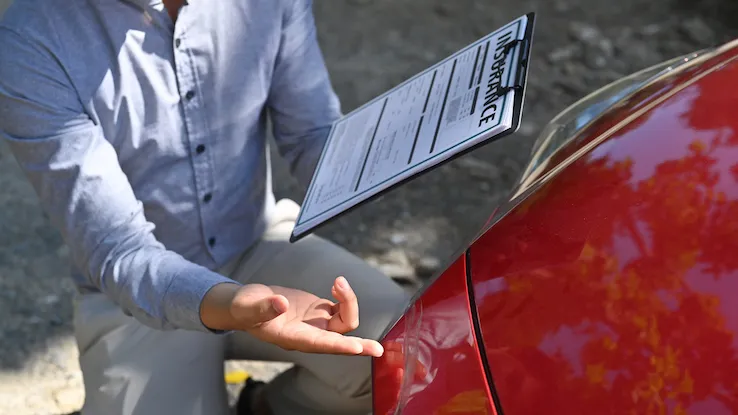Insurance can be an expensive thing to purchase, and there are plenty of factors that can make your premiums cost even more than you anticipated. That being said, despite the costs, there are some types of insurance you really should have. And there are some insurance products you’re legally required to own. But which ones? And why?
If you have insurance questions you’ve always wanted to ask but have hesitated to do so, you’re in luck. We’ve rounded up 16 of the most common insurance questions people have — addressing everything from types of insurance to coverage limitations to networks and more — and their answers.
Usually, yes. Bundling your insurance refers to buying multiple insurance products from one agent or firm. If you buy your auto, renter and life insurance from the same agent, you may save a good amount of money keeping these policies active with that insurance company.
Why? Well, a few reasons. There are some cost reductions that the insurance company in question will get from combining insurance products. The company doesn’t have to put as much work into opening a new account for you. You’ll get some of these costs back through price reductions. However, bundling discounts are largely used as a marketing tool by insurance agencies. They know that if they can sell you one product, they have an increased chance of selling you another. As such, they’ll give discounts to increase their chance of getting more of your money.
However, there may be cases in which bundling your insurance isn’t what’s best for you. Depending on your life circumstances, you may benefit from buying your insurance from different firms. Don’t just default to what an agent tells you. Instead, do your research, get multiple quotes, and use that information to compare prices and determine the best deal.
“Do I have to have auto insurance?”
Yes. In all 50 states, you’re legally required to have auto insurance. Driving without vehicle insurance is a crime and may result in a financial fine, a suspension of your license or even jail time. If your insurance expires, you’re not legally allowed to drive a car until you have an active policy again.
“What are the different kinds of coverage with auto insurance? What do they mean?”
Auto insurance covers several different policy elements. These include:
- Bodily liability insurance, which covers medical and legal costs resulting from a car accident.
- Property damage liability insurance, which covers the cost of damage to someone’s property (including their car) if you damage their property as a result of a car accident.
- Collision coverage, which pays for the actual damage to repair your car if it’s damaged in a collision.
- Uninsured and underinsured motorist coverage, which covers the costs you’d otherwise have to pay out of pocket if you were hit by someone who didn’t have insurance (or whose insurance wasn’t enough to cover the full cost of the damage). Without this coverage, you may have to pay extensive costs if your car is damaged in a hit and run, or hit by someone who doesn’t have insurance.
“My landlord has insurance. Do I need renter’s insurance?”
Yes. A landlord may have insurance on a property, but that protects their property, not your stuff. Furthermore, renter’s insurance protects your items from damage or theft. These are things your landlord’s insurance policy likely doesn’t cover.
“Am I legally required to have renter’s insurance?”
No. However, your landlord may require that you purchase renter’s insurance in order to lease their home, and they’re legally allowed to do so.

“What else does renter’s insurance cover besides my stuff?”
Good news here! Renter’s insurance offers coverage that’s much more comprehensive than just damage to your things. Additional coverage includes personal liability damage and medical costs if someone is injured in your rental property.
Here’s an example. Say you’re having a party in your house, and someone trips and breaks their ankle. They then sue you for negligence. If you have renter’s insurance, you may be covered. The right policy should cover legal costs to defend yourself, the cost of a settlement and the medical costs of your injured guest. This depends on the specifics of your policy, but these costs are covered in many cases.
“What does homeowner’s insurance cover?”
Like renter’s insurance, homeowner’s insurance covers damage to your belongings that’s a result of a covered event. This coverage extends to damage resulting from a natural disaster, fire, theft, accident or other type of event.
However, homeowner’s insurance also covers damage to the home structure itself. For example, let’s say that there was a fire that destroyed your home. Not only would your homeowner’s insurance policy cover the cost of all items inside of your home, but it would also cover the value of the home’s building materials. This coverage means you’d be entitled to recoup the entire value of your home so you could begin to rebuild it.
Your policy may also cover additional costs, like temporary housing or moving costs, you incur from a covered event taking place in or at your home. In addition, some homeowner’s insurance policies also offer liability protection. Liability protection means that the policy may cover the legal and medical costs arising from a covered event inside the home.
“If my toilet floods and damages my stuff, am I covered?”
Yes! Virtually all homeowner’s policies cover accidents that occur inside your home. However, there are some exceptions. For example, let’s say you have a leaky toilet that is liable to flood your home, and a plumber informs you about this. For whatever reason, you decline to fix the toilet, which later floods and destroys parts of your home. In this instance, your insurance company may not cover damages. It could argue that you were negligent in not repairing the toilet. As such, you’d be responsible for covering any incurred costs out of pocket.
“Why do I need additions to my home insurance?”
There are some hazards and types of damage that a typical home insurance policy doesn’t cover. As such, you may need to buy an extra policy (otherwise known as a “rider”) to cover these instances.
Riders can do a few things. First, they can allow you to cover the value of extraordinary items, such as expensive jewelry or a valuable and otherwise irreplaceable collection. Such coverage may be necessary for you because many homeowners’ policies have financial limits. Furthermore, there are some natural disasters homeowners’ insurance doesn’t traditionally cover, such as floods and sinkholes. In these instances, you’ll need to purchase extra insurance to cover expenses if one of these disasters impacts your home.

“Am I legally required to have homeowners’ insurance?”
If you have a mortgage on your home, your lender may require you to purchase a homeowner insurance policy. If you own your home outright, you have no obligation to buy homeowners’ insurance. However, from a purely financial perspective, you need it. Homeowners’ insurance can cover your financial losses in the unlikely event of a disaster in your home. Without insurance, you won’t be able to recoup any of your costs if something terrible happens — and those costs can get expensive. As such, it’s unquestionably a good idea to own this type of insurance to protect the value of what may be your biggest asset.
“If I live alone and don’t have any family, do I need life insurance?”
This honestly depends on you! In most cases, people buy life insurance to ensure the financial health and well-being of their loved ones. However, if you’re single and no one financially depends on your income, you may not need life insurance. Instead, you might want to consider a smaller insurance policy that covers funeral costs if something were to happen to you. Depending on your financial situation and personal preferences, you could then use any remainder of such a policy’s payout to make a charitable donation.
“How much life insurance do I need?”
There’s a variety of differing opinions on the correct answer to this question. Many formulas have been developed over time that attempt to answer it. For example, some say you should multiply your annual income by 10. Others say you need to do that but add an extra $100,000 per child.
The truth is that there’s really no set answer to this question. A simple mathematical formula isn’t adequate for calculating the financial resources that your loved ones will need if something happens to you, and it can’t incorporate all the unique variables that apply to your life. Furthermore, the answer depends on your personal preferences. Will you want any life insurance policy to cover the cost of college for your kids? Do you plan to set up a trust? Will you want your kids’ caretakers to be able to retire?
These questions are best answered after plenty of thought and a conversation with a professional.
“Why do I need a physical exam before getting life insurance?”
Like all insurance policies, life insurance is about risk. Your life insurance company wants to reduce risk and exposure as much as possible. As such, you may have a medical exam to determine if you’re in good health. If the company determines your health presents a higher level of risk, it may not be willing to offer you any insurance. Alternatively, it may offer you life insurance but charge you more. This added charge is to offset the risk it incurs by insuring you.
Determining risk and financial exposure also explains why life insurance companies ask you certain health-related questions about your drinking habits, smoking habits and driving habits.

“What’s the difference between ‘whole’ and ‘term’ life insurance?”
A whole life insurance policy lasts your entire life. This means you pay the same amount for your entire life on your life insurance premiums, no matter how old you are or what kind of health you’re in. As you can imagine, whole life insurance is more expensive than term insurance.
Term life insurance covers you for the length of the policy, known as a term. This allows you to get a life insurance policy that often lasts 10, 20 or 30 years. At the end of your term, your policy expires. You’ll likely have the option to renew your policy at a different cost.
There are extensive differences between the two policies. As always, one cannot be stated as being broadly better than another. The right option ultimately depends on your financial circumstances and needs.
“What do the different terms mean on my health insurance?”
Your health insurance can contain various terms, and many of these can be somewhat confusing. Here’s a quick breakdown of what some of these terms mean:
- Co-insurance: Co-insurance means you pay a set amount of the costs of a procedure or drug. If you have 20% co-insurance, you pay 20% of the cost of a procedure or medication, provided that you’ve already met your deductible.
- Copay: This is a flat fee for certain procedures or doctor visits. Lower copays mean you pay less. You may also have different copays for different procedures. For example, you may pay $25 for a primary care visit but $100 for an emergency room visit.
- Deductible: This is the amount you must pay towards your medical costs in a year before your insurance begins covering them. Say you have a deductible of $2,000. You’ll have to pay $2,000 out of pocket before your insurance begins to cover the procedures or medication costs you incur in that calendar year.
- Out-of-pocket limit: This is the maximum amount that you can pay before your health insurance will be legally required to pay for all of your services.
- Premium: This is the amount you pay for your health insurance policy. You may be charged on a monthly, quarterly or yearly basis. If you have work insurance, your premium may also be removed directly from your paycheck.
“What does ‘in-network’ mean when it comes to my health insurance?”
Your health insurance network has negotiated a special arrangement with a certain provider. The agreement means that the provider will see patients who have that particular health insurance and receive a discounted reimbursement rate. This allows people with approved in-network insurance to visit providers in this network. If your provider doesn’t have an agreement with your health insurance company, you may not be able to see them without paying for the total cost of the visit.



